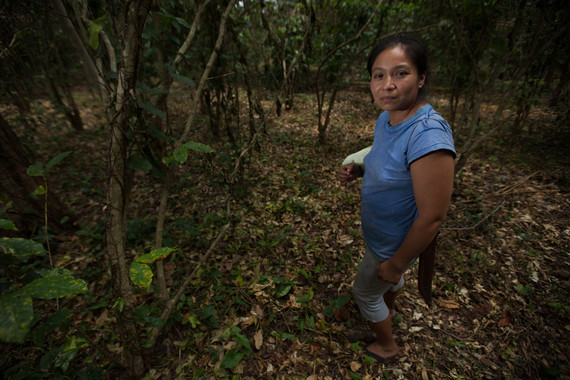
In his clarion call to action on climate change, Pope Francis echoes the statements and sentiments of many religious leaders and church bodies.
The Orthodox Christian churches have long spoken about environmental issues in moral terms, so much so that Ecumenical Patriarch Bartholomew has been called the "Green Patriarch." Last year, the Lutheran World Federation Council adopted a Statement on Climate Justice that called on member churches to adopt eco-friendly practices with the aim of becoming carbon-neutral by 2050. The National Council of Churches, which represents 37 Christian denominations, passed a resolution urging action on global warming nearly a decade ago. For Pope Francis, the urgent need to remedy climate change is a moral imperative.
As a faith-based organization that responds to disasters and works to lift people out of extreme poverty, we at Lutheran World Relief see first-hand that climate change is not a theoretical concept confined to science labs and political debates, but is affecting millions of people. It's time for the U.S. Congress to get on board. Harm caused by rising temperatures is being borne disproportionately by poor and vulnerable, who--despite their enormous resilience in the face of adversity--have the fewest resources to adapt to these changes.
As Americans enthusiastically welcome Pope Francis on his first visit to our country, I am hopeful that his presence will help Americans and our leaders transcend partisan debate. We need to act now to stem the devastation wrought by climate change across the globe. Because the answer to the question of whether there is concrete evidence of climate change is as simple as it is frightening: You bet.
In Central America reduced rainfall and rising temperatures have resulted in prolonged drought and are fueling the spread of coffee leaf rust. Coffee plantations, which for decades have been located in areas cool enough to thwart the disease, can no longer thrive. This devastating disease has wiped out more than half of the crop in El Salvador, Nicaragua, Honduras and Guatemala. As temperatures are rising, farmers are being forced to relocate their crops to higher elevations to chase the cooler temperatures - if they can.
The result is life-threatening: poor farming families dependent on coffee are seeing a huge drop in their income, making it difficult for them to afford sufficient food.
A recent study published in the journal Science Advances found that warming ocean temperatures in the northwestern Pacific have intensified storms by about 10 percent over the past two decades, and forecasts a 14 percent increase in average typhoon intensity by 2100. What that means in lives, makes headlines: since 2011, the Philippines has been hit with four major typhoons, the largest of which, Super Typhoon Haiyan in 2013, affected 14 million people, killing more than 6,000 and causing in excess of $2 billion in damage. Across Southeast Asia, countries such as the Philippines, Myanmar, Vietnam and Indonesia have been battered by increasingly strong and frequent typhoons, fed by warming oceans.
In the Sahel region of West Africa, more than 20 million people are vulnerable to food shortages due to more frequent and intense climate shocks exacerbated by irregular rainfall, and repeated humanitarian crises fueled by armed conflict. Climate trends over the last 40 years in the Sahel show overall temperatures rising, droughts increasing in frequency and severity, and when it does rain, floods are more frequent and intense. The upcoming El Niño weather pattern is predicted to be very strong and exacerbate these effects.
Both the Bush and Obama administrations have agreed that compassionate foreign aid to the poor overseas--through disaster relief, improved health, and sustainable development--is the right thing to do and a critical part of our national security, complementing investments in defense and diplomacy. Because promoting stable and responsible societies and governments promotes our interests as well as our values, instability and assault on the poor and vulnerable unleashed by climate change requires us to respond.
Spurred by the visible, life-threatening effects of climate change, faith leaders across denominations have underlined this moment in history as one in which our values will be tested in our actions. We as Americans need to make a societal commitment. Although the House of Representatives zeroed out climate change funding accounts in this year's debate on the 2016 budget, a US government commitment to funding climate adaptation is required.
One component could well be the Green Climate Fund, a multinational effort to finance efforts to adapt to global warming in the poorest countries, with up to 50 percent of the funds going to projects that build resilience in communities already suffering the effects of climate change. The strongest emphasis will be placed on projects in African countries, small island states and the most economically vulnerable.
May we rise to this challenge and act boldly to protect not only millions of poor, but our future and the future of our children.
This article was originally published on Sept. 22, 2015 in The Hill's Congress Blog.
